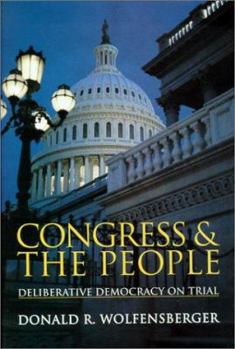Congress and the People: Deliberative Democracy on Trial
Select Format
Select Condition 
Book Overview
Will some form of direct democracy supplant representative, deliberative government in the twenty-first century United States? That question is at the heart of Donald R. Wolfensberger's history of... This description may be from another edition of this product.
Format:Hardcover
Language:English
ISBN:0801863074
ISBN13:9780801863073
Release Date:March 2000
Publisher:Johns Hopkins University Press
Length:308 Pages
Weight:1.36 lbs.
Dimensions:1.1" x 6.3" x 9.3"
Customer Reviews
2 ratings
Congress For The Layman
Published by Thriftbooks.com User , 24 years ago
I stumbled on this book at a good friend's home and, having nothing better to do, started thumbing through it. Well, an hour later I realized that I had stumbled on something quite remarkable. You would assume from the subject matter that it would be dry and heavy going. Not so. I found it most absorbing, giving insight to the real Congress, not what you might discern from news reports. The author obviously knows and enjoys his subject and it comes through clearly and informatively.
A Certain Level of Mistrust
Published by Thriftbooks.com User , 24 years ago
D. R. Wolfensberger has produced a work that is exceptionally relevant for our times. While many books of the political science genre are boring and confusing to the average reader, Congress & The People: Deliberative Democracy On Trial was interesting to read and easy to understand. The Founders of our nation instituted a system of representative, deliberative democracy in which Congressional representatives, Congressmen and Senators, are elected by the people and represent their constituency in creating and passing laws that govern this country. The alternative to that is a direct democracy in which the whole of the citizenry vote on every particular bill. The author provides an exacting background analysis into how and why the Founders decided on the form of representative deliberative democracy that, while having evolved somewhat, is still in use today. The book begins in the post-Revolution United States, as the Founders discuss what the Constitution should consist of and how the federal government should be structured. After covering all that it took to create the Constitution and the three branches of our current government, the author moves the reader briefly through the early 20th century providing a look at how Congress has changed over roughly one hundred years. Following this brief stop the reader finds himself in the post-Vietnam War 1970s. For the next eight chapters the author discusses changes to Congress and Congressional procedures due to such influences as improved mass media, television, Vietnam, presidential impeachment, calls for term limits, etc.. The final chapter delivers a thoughtful conclusion that provides a capstone explanation of Congressional behavior from the past to the present and what the future of deliberative democracy should be. The author takes a critical look at the birth, maturation, and current status of deliberative democracy in the United States. Is deliberative democracy still a viable means of self-governance or should direct democracy now take over with assistance from the technological revolution that is taking place? Moreover, if deliberative democracy is still the wisest avenue are the current and future generations of Senators and Congressmen up to the task, morally and ethically, of carrying out the people's will without putting their own desires ahead of what is good for the nation? These are the questions the author seeks to answer throughout his book. As previously mentioned the author examines the constitutional origin of our form of government with great detail in order to determine how and why our country operates under a representative, deliberative democracy versus a direct democracy. He very openly and accurately illustrates how the Founders decided after much debate that the citizenry could not be trusted with the governance of the country. In 1789 Representative Thomas Hartley of Pennsylvania concluded that:"We have seen it attended with b






